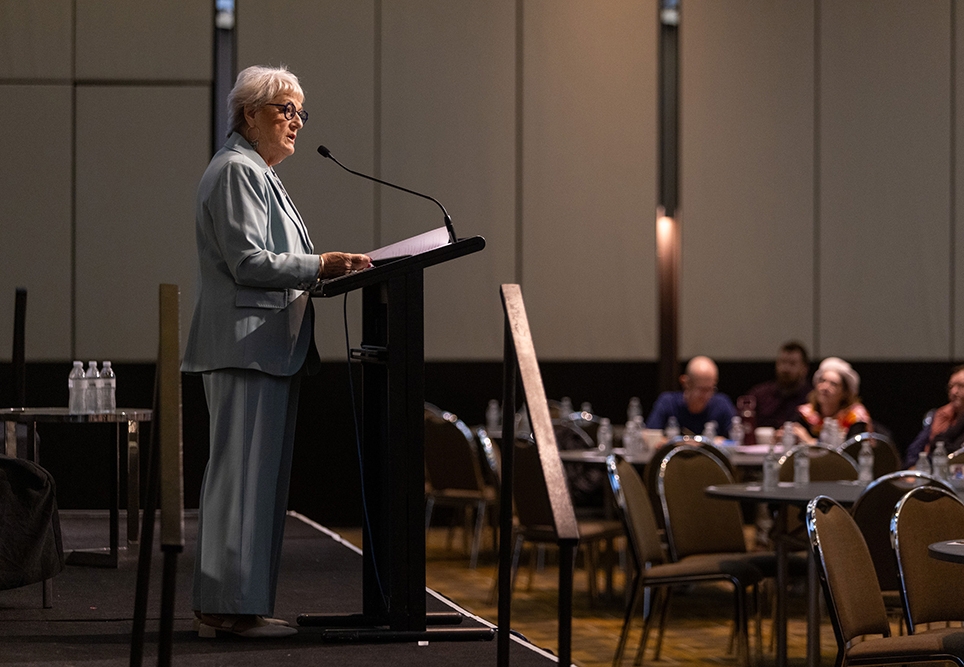“I’m not an academic and have not earned my stripes through contributing to ground-breaking research. My professional career is not noteworthy, I have never been a senior manager or in any position of influence or importance. But I have not been afraid to speak up or write or contribute to submissions for change. I would say my approach is small realistic bites.
“What I can say is that I turn up at the coal face every day – and have done so for over 40 years: working alongside like-minded people, always thinking I can help, I can support, so that together we can improve the lives of people in the Bush and the people who care for them.
“I see the inequality that exists and it motivates me to want better for the Bush and I am lucky enough to have a partner along for the ride.”
For Sharon, who became a Fellow in 2010, the things that are “better for the bush” revolve around the provision of high-quality primary health care.
Sharon is an advocate for strengthening the remote workforce both in health centres and the community and enabling the consumers who use the services. Over the years, this has involved recruiting and assisting with the training of local health and community workers and supporting community groups such as strong women’s programs, early intervention programs for children and aged care. She has been involved in training and supporting remote area nurses so they not only survive but enjoy the experience so they can give the best service they can. Encouraging the shift towards Aboriginal community-controlled Health organisations (ACCHOs) has been an important priority.
“I have been nursing for over 40 years now and only a handful of those years have been in an urban setting – and that was while training – so I guess you could say I love the Bush, the people, the land and the spirit,” says Sharon.
Currently Sharon and her husband Phil, who trained as a Registered Nurse while they were based in East Arnhem, work together as the mobile remote team for Katherine West Health Board. They cover around 40,000 km a year, visiting cattle stations and some small Indigenous communities without a clinic.
“I was already sold on the value of primary health care so this job has been another great opportunity to practise what we preach and to broaden my scope of practise in this area,” says Sharon. “When people live in such isolated areas, its important for them to have regular health checks but access is not so easy. So along we come, setting up under the shade of a tree, or in a spare room offering proactive screening and assistance with management of chronic conditions and pre-existing conditions. This job allows us to use every primary health care skill set across the lifespan. This includes my first love, child health, women’s and maternal health also sexual health, men’s health, chronic disease management, tobacco and alcohol assessment and counselling; assessing nutrition and hydration, immunisation, skin spot checks and other skin related problem; psychological and mental health support, plus a bit of acute care as the need arises.
“All aspects of our work is important but I think mental/ emotional health support is one of our main roles. Living remote can come with a unique set of stresses for everyone. During our well-person checks we provide a human contact that is private, safe, an opportunity to get things spoken that may be worrying them, and we sit around the dinner table with staff and we normalise talking about mental health asking them questions about how they are travelling.”
Sharon and Phil work closely with all members of the extended Katherine West staff and visiting specialist teams. “If needs are identified, you then have the capacity to phone a friend to get appropriate help from the network of health professionals. Last year the COVID-19 restrictions saw station people even more isolated than usual and it was a busy and rewarding year as we picked up many of the services that people would normally visit their GP for.”
Sharon has been present for a lot of change in remote health over the years. “The good and the bad,’ she says.
“Child survival from acute illness has improved. But diseases that are preventable like rheumatic heart disease, that should not still be there.
“I thought I knew poor, what poor people had to put up with, but to live with people who are living in absolute poverty without their basic human rights being met bring home the spiral of consequences that comes with that. A big thing for me dealing with mainly women in my early years in remote was the level of family violence and how normalised that was. It was both confronting and saddening. I gained a great respect for the women in Indigenous communities how they could carry on. Their spirit always amazed me.
“The intervention broke my heart. How that was rolled out and the big spoon of disrespect that came with it. But despite that set back I have seen some positive changes, which should be our focus. Phil and I are both proud to work for an Indigenous health board: they get the priorities right and there are less delays due to bureaucracy. It’s great to work in an organisation that places health promotion and preventive health measures in such high esteem.
There were limited Indigenous resources when Sharon started working in remote communities about 20 years ago, so she started producing appropriate materials. She recalls a Paul Hogan-style response from a group of Indigenous women presented with a perky pair of pink breasts to talk about checking for breast lumps . “One woman lifted up her top,” says Sharon, “and said ‘they’re not breasts, these are breasts’. Now, the ACCHOs ensure resources are approved by the local Indigenous people.
“Working in communities is a roller coaster,” says Sharon. “You work with some of the most amazing mixture of people and the opportunities are endless in the most beautiful landscape.
“I wish I could say I felt supported as a remote area nurse but to be honest most of the time I did not. Over the years I saw some amazing nurses who were committed to doing a good job in often extreme circumstance leave remote burnt out and damaged. The turnover of staff in communities was high and there was little empathy for those that were deemed to be showing weakness. I had a conversation with a manager once who said “remote nurses are disposable items – there’s always fresh fodder looking for a remote adventure.” I hope it’s not like that now.”
“What’s next for us?” Sharon muses. “Not quite ready for retirement. I am thinking some sort of teaching, of health workers or nurses new to remote.
“Both of us absolutely believe that that is one of best ways to help remote communities and the people that live in them.”



